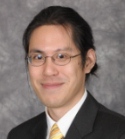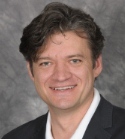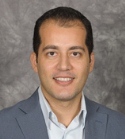New Faculty 2012 – 2013
 Mercedes Cabrerizo, Ph.D. MERCEDES CABRERIZO
ELECTRICAL AND COMPUTER ENGINEERING
Mercedes Cabrerizo is the Mark Edwards Endowed Assistant Professor in the Department of Electrical and Computer Engineering at Florida International University. She received her Ph.D. degree in Electrical Engineering from FIU in August 2006. While a graduate student at FIU, she received the prestigious National Science Foundation graduate research fellowship. Her research interests include image and signal processing applied to 3D source localization in pediatric epilepsy. Her Ph.D. dissertation established a clear delineation between electrodes that led to seizures from those that did not in the absence of the ictal event. Her research work as the Ware Foundation Research Scientist has led to the comprehensive 3D source localization approach which has since been in clinical application at Miami Children’s Hospital. The success of the 3D source localization approach led to its implementation at Baptist Hospital for the adult population. She is now expanding her work to include spike-triggered functional magnetic resonance (fMRI) imaging which allows for the validation of the seizure onset in the EEG through MRI imaging, a work under implementation with the epilepsy program at Baptist Hospital. With the new TMS (transcranial magnetic stimulation) system that was acquired through a major National Science Foundation grant, Dr. Cabrerizo is taking the lead in developing algorithms that could confirm and consolidate the results obtained through the EEG-based 3D source localization and the spike-triggered functional MRI through noninvasive brain stimulation. Her research findings are published in engineering and medical journals.
 Irene Calizo, Ph.D. IRENE CALIZO
ELECTRICAL AND COMPUTER ENGINEERING
Irene Calizo received her Ph.D. in Electrical Engineering from University of California Riverside. Prior to that, she earned her MS in Electrical Engineering from San Jose State University, Bachelor of Electrical Engineering from Georgia Institute of Technology, and BS in Physics from Spelman College. She was awarded the NASA Women in Science and Engineering full scholarship as an undergraduate student, University of California Riverside Dr. Gordon S. and Anna Watkins Commencement Award as a graduate student, and a National Research Council Postdoctoral Research Fellowship at the National Institute of Standards and Technology after her Ph.D. She is a member of the American Physical Society (APS), Institute for Electrical and Electronics Engineers (IEEE), International Society for Optical Engineering (SPIE), Materials Research Society (MRS), and Society of Women Engineers (SWE). Her research covers the broad and interdisciplinary area of nanomaterials and devices, incorporating chemistry, physics, and engineering, with the aim of exploring applications in nanoelectronic devices. The focus of her recent experimental activities has been on using Raman spectroscopy to study of phonon signatures from atomic layers of graphene and the interaction of metal and graphene.
 Arif Islam, Ph.D. ARIF ISLAM
ELECTRICAL AND COMPUTER ENGINEERING
Arif Islam received his B.Tech. in Electronics Engineering from A.M.U., India in 1994, and M.S. degree in Electrical and Computer Engineering from University of Florida, Gainesville. Dr. Islam received his Ph.D. degree in Electrical Engineering from the University of South Florida, Tampa, Florida. He joined Siemens in 1994 and worked in the industry for nine years executing many multi-million dollars projects. Before joining FIU, he was Assistant Professor of Electrical Engineering at the University at Buffalo, the State University of New York (SUNY) and the Deputy Director of the Power Center for Utility Explorations. He is co-developer of the DOE funded Gateway to Power (G2P) Project along with FPL/NextEra company. He is involved in one of the largest Smart Grid implementation in the world. His significant work in energy storage, microgrid and DSM is demonstrated by Sustainable Electric Energy Delivery Systems (energy storage effort) in Florida. He is also co-principle investigator in the study of reliability & predictability of high penetration renewable resources power plants (DOE funded Sunshine State Solar Grid Initiative (SUNGRIN).
 Shaolei Ren SHAOLEI REN
SCHOOL OF COMPUTING AND INFORMATION SCIENCES
Shaolei Ren received his B.E. degree in Electronic Engineering from Tsinghua University in July 2006, the M.Phil. degree in Eletronic and Computer Engineering from Hong Kong University of Science and Technology in August 2008, and the Ph.D. degree in Electrical Engineering from University of California, Los Angeles, in June 2012. Dr. Ren’s research interests include cyber-physical systems, cloud computing, and network economics. He received the Best Paper Award at IEEE International Conference on Communications in 2009 and was selected by IBM T. J. Watson Research as one of the 10 Emerging Leaders in Multimedia and Signal Processing in 2010. Dr. Ren will hold a joint appointment as Assistant Professor in the School of Computing and Information Sciences and the Department of Electrical and Computer Engineering.
 Shuliang Jiao, PhD SHULIANG JIAO
BIOMEDICAL ENGINEERING
Shuliang Jiao, PhD, is an associate professor in the Department of Ophthalmology and the Department of Biomedical Engineering at University of Southern California. He received his PhD in Bio-medical Engineering from Texas A&M University in 2003. His research interest is bio-optical imaging. His current research focus is optical coherence tomography (OCT) and photoacoustic microscopy with the emphasis of their applications in eye imaging. He is one of the pioneers in Mueller-matrix polarization-sensitive OCT, OCT small animal ocular imaging, and photoacoustic retinal imaging. He also holds four US patents and several US patent applications.
 Wei Zeng, Ph.D. WEI ZENG
SCHOOL OF COMPUTING AND INFORMATION SCIENCES
Dr. Wei Zeng is an assistant professor in the School of Computing and Information Sciences at Florida International University. Dr. Zeng received her Ph.D. from Chinese Academy of Sciences in 2008. Her Ph.D. thesis research was completed during her stay at Stony Brook University under the supervision of Dr. David Gu (Stony Brook University) along with Harry Shum (Microsoft Research Asia); the thesis topic is “Computational Conformal Geometry Based Shape Analysis”. Her research interests include computational Conformal and Quasiconformal geometry, discrete Ricci flow, geometric analysis, and their applications to surface matching, registration, tracking, recognition, and shape analysis. Her research areas span over medical imaging, computer vision, computer graphics and visualization, wireless sensor network, geometric modeling and computational topology. She has published more than 50 papers in peer-reviewed journals (e.g., TPAMI, TVCG) and conferences (e.g., ECCV, CVPR, VIS, SPM, INFOCOM, MICCAI), won a Best paper award in CAD/CAM (IJCC 2009), and has two pending U.S. patents on virtual colonoscopy techniques.
 Xin Sun XIN SUN
SCHOOL OF COMPUTING AND INFORMATION SCIENCES
Xin Sun is currently a Ph.D. candidate in the Internet Systems Laboratory in the School of Electrical and Computer Engineering at Purdue University. He received his B.E. degree in Computer Engineering from University of Science and Technology of China in 2005. His research interests are in the design and management of emerging networks and networked systems (e.g., enterprise networks and peer-to-peer systems), and in the migration of such networks and systems to innovative architectures (e.g., cloud computing). He is a recipient of the Bilsland Dissertation Fellowship from Purdue University Graduate School, and a finalist for Intel Ph.D. fellowship.
 Ismail Guvenc, Ph.D. ISMAIL GUVENC
ELECTRICAL AND COMPUTER ENGINEERING
Dr. Ismail Guvenc (senior member, IEEE) received his Ph.D. degree in electrical engineering from University of South Florida, Tampa, FL, in 2006, with an outstanding dissertation award. He was with Mitsubishi Electric Research Labs in Cambridge, MA, in 2005, and with DOCOMO Innovations, Inc., Palo Alto, CA, between 2006-2012, working as a research engineer. Since August 2012, he has been an assistant professor with Florida International University. His recent research interests include heterogeneous wireless networks and future radio access beyond 4G wireless systems. He has published more than 70 conference and journal papers, and several standardization contributions in IEEE. He co-authored/co-edited three books for Cambridge University Press, is an editor for IEEE Communications Letters and IEEE Wireless Communications Letters, and was a guest editor for two special issue journals on heterogeneous networks. Dr. Guvenc holds 13 U.S. patents, and has another 13 pending U.S. patent applications.
 Jorge J Riera, Ph.D. JORGE RIERA
BIOMEDICAL ENGINEERING
Jorge Riera earned his B.S. in Physics from the University of Havana. From 1995-1998, he was a “Junior Associate” of the International Centre for Theoretical Physics in Trieste, where he completed the credits for a master degree in biophysics. He received a Ph.D. in physics from the University of Havana. Some of his doctoral work was completed through CNRS fellowships at the Pitie-Salpetriere Hospital in Paris. His training continued as a postdoctoral fellow in Japan, with terms at RIKEN Brain Science Institute and Tohoku University. Previously as associate professor at Tohoku University School of Medicine, Riera established, with grants of over $5 million, one of the most complete laboratories for the study of brain disorders using pre-clinical rodent models and brain mapping tools. His research activity was extensively funded by the Japan Society for the Promotion of Science, the Telecommunications Advancement Organization of Japan and the Japan Science and Technology agency. Riera’s research is focused on developing strategies to integrate different modalities of brain imaging for the understanding of multicellular signaling in the neocortex. Based first on data from humans and later from rodents, Dr. Riera and his multidisciplinary group have developed biophysical models of the cortical microcircuits and neurovascular/metabolic coupling. These models underlie US-patented methods to study the multi-scale dynamics of neuronal masses and to solve the spatiotemporal inverse problems in brain imaging. This understanding is essential for investigating mechanisms that underlie altered brain function that occurs with aging, trauma or disease. Riera has more than 50 peer-reviewed publications. He has won several awards including a junior reward at the World Congress of Neuroscience (IBRO), Kyoto, Japan and a prize for excellence in teaching at the University of Havana. He is currently on the editorial boards of PLoS One, Frontiers in Neuroscience and the Journal of Integrative Neuroscience. He is member of several professional societies.
 Ning Xie NING XIE
SCHOOL OF COMPUTING AND INFORMATION SCIENCES
Ning Xie received his Ph.D. degree in Computer Science from MIT under the supervision of Prof. Ronitt Rubinfeld. His main research area is theory of computing, in particular sublinear algorithms. He received an M.S. degree in Computer Science from the State University of New York at Buffalo, an M.S. in heoretical Physics from Fudan University and a B.E. degree in Shipbuilding Engineering from Harbin Engineering University.
 KINGSLEY LAU KINGSLEY LAU
CIVIL AND ENVIRONMENTAL ENGINEERING
Kingsley Lau graduated from the University of South Florida in 2010 with a Ph.D. in Civil Engineering. Prior to joining the faculty of Florida International University, he served as Corrosion Research Scientist at the Florida Department of Transportation State Materials Office. His research interests include materials for civil infrastructure and corrosion of engineering materials. He has a strong record of published work in the field of corrosion science and engineering including over 15 peer reviewed papers and several technical final reports.
 RADU JIANU RADU JIANU
SCHOOL OF COMPUTING AND INFORMATION SCIENCES
Radu Jianu received the PhD degree in computer science from Brown University and is currently a professor at Florida International University. His research centers on applications of data visualization and computer graphics to other scientific disciplines and application areas.
 RALF W. ARNDT RALF W. ARNDT
CIVIL AND ENVIRONMENTAL ENGINEERING
Dr. Ralf Arndt is a civil engineer with Diploma (German equivalent to M. S.) and Dr.–Ing. (German equivalent to PhD) of the Technical University of Berlin in civil engineering with more than 10 peer reviewed journal publications and 30 conference proceedings.
In January of 2011, Dr. Arndt joined Rutgers University as a postdoctoral research associate in the field of non-destructive evaluation (NDE) and deterioration assessment of civil structures in the Center for Advanced Infrastructure and Transportation (CAIT) where was involved in the Fort Bowie National Landmark assessment and restoration, the SHRP 2 project “Nondestructive Testing to Identify Concrete Bridge Deck Deterioration” as an expert for passive IR inspection; Federal Highway Administration’s (FHWA) Long-Term Bridge Performance (LTBP) Program; the NIST funded ANDERS project. From 2008 to 2011, Dr. Arndt was research fellow of the National Research Council (NRC) of the US National Academies of Science at FHWA’s NDE Center, where he was utilizing NDE methods, such as: ground penetrating radar, IR thermography, half-cell potential and ultrasonic echo to characterize the deterioration of reinforced concrete structures. Before coming to the US in 2008 he was 5 years working in the Federal Institute for Materials Research and Testing (BAM) in Germany in the field of non-destructive testing in civil engineering. Among other things he was involved in the European project “Onsiteformasonry”, a project for inspection and rehabilitation of historic masonry structures and in an advanced research project on the application of active thermography in civil engineering funded by the German Research Foundation (DFG).
 IOANNIS ZISIS IOANNIS ZISIS
CIVIL AND ENVIRONMENTAL ENGINEERING
Dr. Zisis received his Civil Engineering Diploma from the Aristotle University of Thessaloniki (Greece) and both his MASc and PhD in Building Engineering from Concordia University (Montreal, Canada). Before joining FIU he was a Postdoctoral Fellow in the Building Aerodynamics Laboratory at Concordia University. His research focuses on wind effects on structures and urban habitat construction, codification of wind-induced loads and model and full-scale experimental wind engineering. Dr. Zisis has over 30 publications on international journals and conference proceeding and he is a member of the Structural Wind Engineering Committee (SWEC) and Environmental Wind Engineering Committee (EWEC) of the Technical Council on Wind Engineering (TCWE-ASCE).
next page
|

